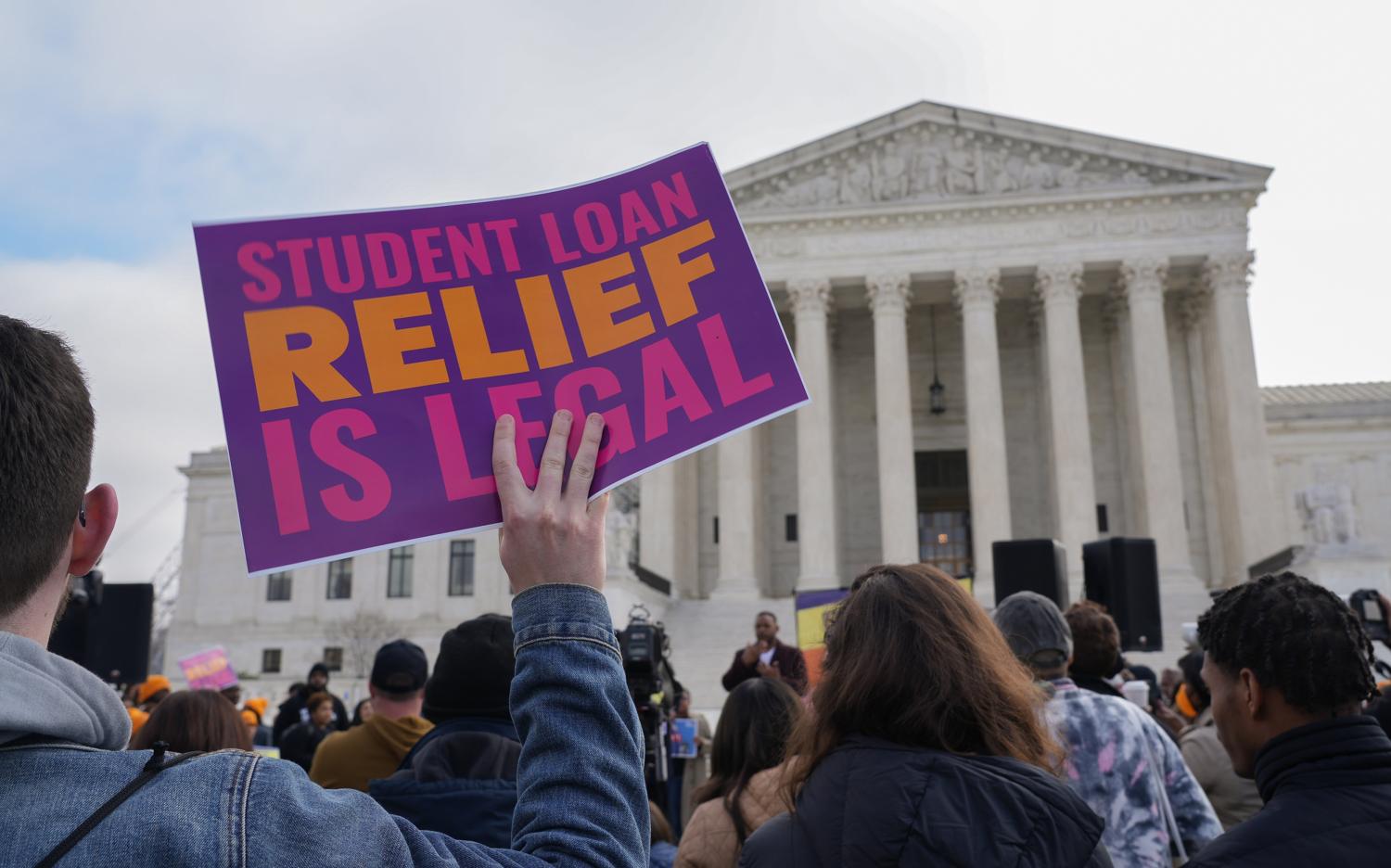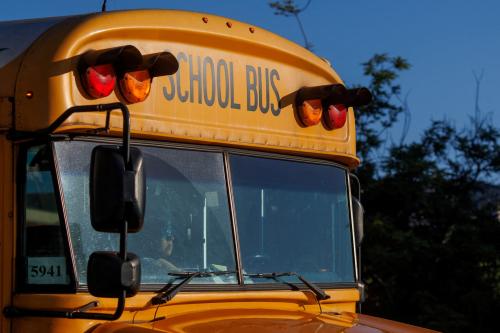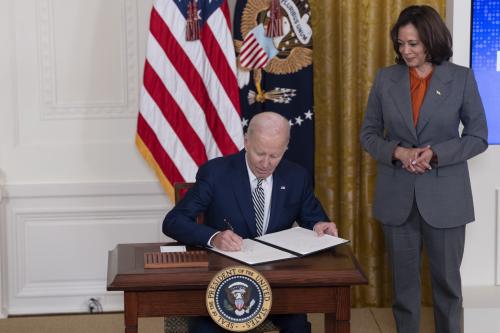As we reflect back on 2023, a tumultuous year in which the United States struggled with complex policy issues both here and abroad, we feel it’s important to contemplate what our stakeholders found to be the most interesting ideas and issues of the year. Which policy questions drew the most interest, and what can we learn from that? Below you will find a list of the 10 most-read articles written by policy experts from the Governance Studies program at Brookings.
Elections
In our look back at the issues of 2023, it will come as no surprise that Americans, along with people from around the world, began focusing on election issues early this year. The potential for a Biden-Trump rematch along with the significance of specific issues like public safety and the Israel-Gaza war rose to the top of the most read list. People have been particularly interested in how younger voters might change politics in 2024 and beyond—an ongoing discussing in our series on younger voters from the Center on Effective Public Management.
SCOTUS higher education rulings
The Supreme Court of The United States (SCOTUS) heard two cases involving higher education that sparked widespread interest because they ruled against affirmative action—a huge structural change for colleges and universities—and blocked the Biden administration’s student loan forgiveness program, a particularly popular issue with younger voters.
Artificial Intelligence
Last but certainly not least, artificial intelligence (AI), particularly generative AI, dominated conversations across policy and cultural spheres. How will AI affect future elections? How do we solve political bias in AI platforms? And how should AI be integrated into the classroom? Our Center for Technology Innovation scholars heeded the call for answers and policy recommendations throughout the year.
March 1, 2023
On February 28, 2023, the Supreme Court heard arguments in two cases regarding the Biden administration’s proposed student loan forgiveness program—Biden v. Nebraska and U.S. Department of Education v. Brown. The cases focused on two key questions: Do the petitioners meet the constitutional requirement for “standing,” or injury, from the policy, and does the Department of Education have the legal authority to forgive student loan debt?
March 2, 2023
In this post, Bill Galston reviews the events of the Chicago mayoral primary on February 28, 2023. The incumbent, Lori Lightfoot, received only 17% of the vote, failed to finish in the top two, and was ineligible to participate in the April runoff that elected Chicago’s current mayor, Brandon Johnson. Why did this happen, and what does it mean for the future of Chicago politics and, for that matter, Democratic Party politics?
February 27, 2023
Political scientists and forward-looking politicians have been debating the ultimate impact of the two youngest American generations—Plurals (Gen Z) and Millennials—on the nation’s partisan future for some time. With these two generations scheduled to become a majority of the American electorate later this decade, election results and a spate of recent data from the Pew Research Center are providing an increasingly persuasive answer.
March 20, 2023
John Villasenor believes AI will fundamentally reshape the practice of law. Law firms that effectively leverage emerging AI technologies will be able to offer services at lower cost, higher efficiency, and with higher odds of favorable outcomes in litigation. Law firms that fail to capitalize on the power of AI will be unable to remain cost-competitive, losing clients and undermining their ability to attract and retain talent.
June 2, 2023
According to Elaine Kamarck, Trump is not your ordinary front-runner. He has been indicted and may face more indictments before the Republican convention next summer. He has doggedly stuck to cultivating his base, which, while intense and loyal, is not likely to carry him in a general election. While he is loved, he is also hated, meaning that he will certainly have problems in the general election.
June 5, 2023
Almost from the start, race-based affirmative action has divided the Court, as well as the nation. As the Supreme Court revealed its decisions in Students for Fair Admissions, Inc. (SFAI) v. President and Fellows of Harvard and SFAI v. University of North Carolina, Richard Lempert predicted the Supreme Court majority would:
- Read the 14th amendment as barring the use of racial preferences by public colleges and universities and;
- Interpret Section VI of the 1964 Civil Rights Act as similarly restricting race-conscious admissions at any school receiving federal funds.
February 23, 2023
Foreign policy has never been a front and center issue for the American public unless the country was involved in a major war, write Elaine Kamarck and Jordan Muchnick. Thus, it is not surprising that American attitudes on foreign policy are hard to pin down. In some instances, pollsters may simply be measuring non-attitudes. In other scenarios, Americans may have a complex set of opinions—favoring, for instance, a general isolationist approach but valuing at the same time our alliances and our participation in international organizations or favoring our position in Ukraine but preferring economic warfare to troop deployments. This poses a challenge for policymakers, but also illustrates the importance of clear leadership and messaging when it comes to foreign policy.
May 8, 2023
The release of OpenAI’s ChatGPT in late 2022 made a splash in the tech world and beyond. A December 2022 Harvard Business Review article termed it a “tipping point for AI,” calling it “genuinely useful for a wide range of tasks, from creating software to generating business ideas to writing a wedding toast.” Within two months after its launch, ChatGPT had more than 100 million monthly active users—reaching that growth milestone much more quickly than TikTok and Instagram.
April 25, 2023
The EU and the U.S. are jointly pivotal to the future of global AI governance. Ensuring that EU and U.S. approaches to AI risk management are generally aligned will facilitate bilateral trade, improve regulatory oversight, and enable broader transatlantic cooperation.
The U.S. approach to AI risk management is highly distributed across federal agencies, many adapting to AI without new legal authorities.
August 7, 2023
In this post, Regina Ta and Darrell West review current responses to generative AI across K-12 public school districts and explore what remains to be done. In 2023, public schools have followed one of three strategies, either banning generative AI, integrating it into curricula, or placing it under further review.
The Brookings Institution is committed to quality, independence, and impact.
We are supported by a diverse array of funders. In line with our values and policies, each Brookings publication represents the sole views of its author(s).














Commentary
Governance Studies’ most read articles in 2023: AI, elections, SCOTUS cases, and more
December 28, 2023